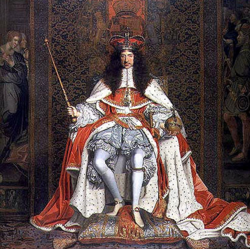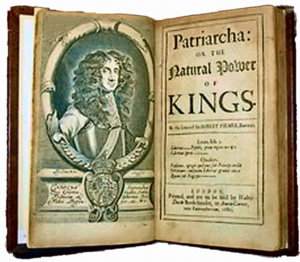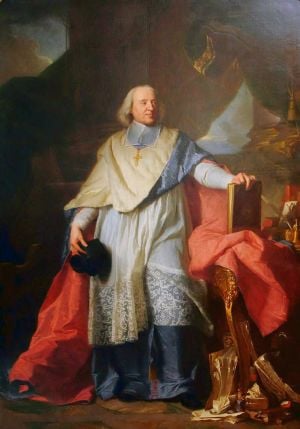Difference between revisions of "Divine Right of Kings" - New World Encyclopedia
m |
|||
| Line 20: | Line 20: | ||
==Divine Right in England== | ==Divine Right in England== | ||
| + | [[Image:Patriarcha-Book of-Robert Filmer Originally from 1680.png|thumb|300px|Robert Filmer's ''Patriarcha'' (1680), in which he defended the theory of Divine Right]] | ||
The Scriptural basis of the Divine Right of Kings comes partly from [[Epistle to the Romans|Romans]] 13:1-2, which states: "Let every soul be subject unto the higher powers. For there is no power but of God: the powers that be are ordained of God. Whosoever therefore resisteth the power, resisteth the ordinance of God: and they that resist shall receive to themselves damnation." | The Scriptural basis of the Divine Right of Kings comes partly from [[Epistle to the Romans|Romans]] 13:1-2, which states: "Let every soul be subject unto the higher powers. For there is no power but of God: the powers that be are ordained of God. Whosoever therefore resisteth the power, resisteth the ordinance of God: and they that resist shall receive to themselves damnation." | ||
| Line 37: | Line 38: | ||
In the mid-seventeenth century, Sir [[Robert Filmer]] propounded the idea that the king was, in effect the head of the in the same sense that a father is the head of his family. In this theory Adam was the first king and Charles I stood in the position of Adam in England, with absolute authority to rule. John Locke (1632–1704) effectively challenged this theory in his ''First Treatise of Civil Government'' (1689), propounding the idea of a [[social contract]] between the ruler and his subject and affirming the principle that the people had the right to challenge unjust royal power. Locke's ideas, including the principle of God-given rights of life, liberty and property, became seminal in the [[Glorious Revolution]] and especially in the American Revolution of 1776. | In the mid-seventeenth century, Sir [[Robert Filmer]] propounded the idea that the king was, in effect the head of the in the same sense that a father is the head of his family. In this theory Adam was the first king and Charles I stood in the position of Adam in England, with absolute authority to rule. John Locke (1632–1704) effectively challenged this theory in his ''First Treatise of Civil Government'' (1689), propounding the idea of a [[social contract]] between the ruler and his subject and affirming the principle that the people had the right to challenge unjust royal power. Locke's ideas, including the principle of God-given rights of life, liberty and property, became seminal in the [[Glorious Revolution]] and especially in the American Revolution of 1776. | ||
| + | |||
==Divine Right in France== | ==Divine Right in France== | ||
[[Image:Jacques-Bénigne Bossuet 3.jpg|thumb|left|Bishop Jacques-Bénigne Bossuet, primary promoter of the theory of Divine Right in Catholic France]] | [[Image:Jacques-Bénigne Bossuet 3.jpg|thumb|left|Bishop Jacques-Bénigne Bossuet, primary promoter of the theory of Divine Right in Catholic France]] | ||
Revision as of 01:37, 20 September 2008

The Divine Right of Kings is a political and religious doctrine of political absolutism. It asserts that a monarch is subject to no earthly authority, including the pope, deriving his right to rule from the will of God. The king is thus not subject any temporal authority, including the will of his subjects, the aristocracy, or any other estate of the realm. The doctrine implies that any attempt to depose the king or to restrict his powers runs contrary to the will of God and may constitute treason.
The origins of the theory are rooted in the medieval idea that God’s had bestowed earthly power to the king, just has he had given spiritual power and authority to the church, centering on the pope. With the rise of nation-states and the Protestant Reformation however, the theory of Divine Right justified the king's absolute authority in both political and spiritual matters. The theory came to the fore in England under the reign of King James I (1603–25). King Louis XIV of France (1643–1715), though Catholic, strongly promoted the theory as well.
The theory of Divine Right was abandoned in England during the Glorious Revolution of 1688–89). The American and French revolutions of the late eighteenth century further weakened theory's appeal, and by the early twentieth century it has been virtually abandoned.
Background
The concept of Divine Right is also found in many other cultures including Aryan and Egyptian traditions. In pagan and heathen religions the king was often seen as a kind of god and so was an unchallengeable despot. The Jewish tradition balanced the unbridled authority of the Israelite kings against that of the the prophets, who often challenged the kings and sometimes even overthrew them in God's name.
The ancient Roman Catholic tradition dealt with the issue of royal absolutism with the doctrine of the "Two Swords," promulgated by Pope Gelasius I (late fifth century). Gelasius held that both the royal and priestly powers were bestowed by God, but that the pope's power was ultimately more important:
There are two powers, august Emperor, by which this world is chiefly ruled, namely, the sacred authority of the priests and the royal power... You are also aware, dear son, that while you are permitted honorably to rule over humankind, yet in things divine you bow your head humbly before the leaders of the clergy and await from their hands the means of your salvation.
During the Renaissance, national powers often struggled with the papacy over various issues, and the Protestant Reformation further exacerbated the need of kings to justify their independence from Rome and assert their authority over religion in their realms. The advent of Protestantism also removed the counterbalancing power of the independent church and returned the royal power to a potential position of absolutism.
Thomas Aquinas even allowed for the overthrow of a king (and even regicide when the king was a usurper and thus no true king) but he forbade, as did the Church, the overthrow by his subjects of any legitimate king. The only human power capable of deposing the king was the pope.
Towards the end of the Middle Ages many philosophers such as Nicholas of Cusa and Francisco Suarez propounded similar theories. The Church was the final guarantor that Christian kings would follow the laws and constitutional traditions of their ancestors and the laws of God and of justice. Similarly, the Chinese concept of Mandate of Heaven required that the emperor properly carry out the proper rituals, consult his ministers, and made it extremely difficult to undo any acts carried out by an ancestor.
Divine Right in England
The Scriptural basis of the Divine Right of Kings comes partly from Romans 13:1-2, which states: "Let every soul be subject unto the higher powers. For there is no power but of God: the powers that be are ordained of God. Whosoever therefore resisteth the power, resisteth the ordinance of God: and they that resist shall receive to themselves damnation."
In English-speaking world, the theory of Divine Right is largely associated with the early Stuart reigns in Britain and the theology clergy who held their tenure at the pleasure of James I, Charles I, and Template:Charles II. The main English tracts supporting the Divine Right of Kings were written in 1597-98 before his accession of James VI of Scotland to the English throne as James I. Basilikon Doron, a manual on the duties of a King, was written by James I himself to edify his four-year-old son Henry Frederick, Prince of Wales, affirming that a good king "acknowledgeth himself ordained for his people, having received from God a burden of government, whereof he must be countable."
The conception of royal ordination by God brought with it largely unspoken parallels with the Anglican and Catholic priesthood, but the overriding metaphor in James' handbook was that of a father's relation to his children. "Just as no misconduct on the part of a father can free his children from obedience to the fifth commandment (to honor one's father and mother), so no misgovernment on the part of a King can release his subjects from their allegiance."[1] James also had printed his Defense of the Right of Kings in the face of English theories of inalienable popular and clerical rights.
What distinguished the English idea of Divine Right from the Roman Catholic tradition was that in the latter, the monarch is always subject to the following powers, which are regarded as superior to the monarch:
- The Old Testament, in which the authority of kings could be rightly challenged ad sometimes overthrown by the prophets speaking in the name of God
- The New Testament in which the first pope, St Peter, commands that all Christians shall honor the Roman Emperor (1 Peter 2:13-17) even though, at that time, he was still a pagan emperor.
- The endorsement by the popes and the Church of the line of emperors beginning with the Constantine I and Theodosius I, later the Eastern Roman emperors, and finally the Western Roman emperor, Charlemagne.
The English clergy, having rejected the pope and Roman Catholicism, were left only with the supreme power of the King who, they taught, could not be gainsaid or judged by anyone. Since there was no longer the counter-veiling power of the papacy and since the Church of England was a creature of the state and had become subservient to it, this meant that there was nothing to regulate the powers of the king, who had become an absolute power. In theory, divine law, natural law, and customary and constitutional law still held sway over the king. However, absent a superior spiritual power, such concepts could not be enforced, since the king could not be tried by any of his own courts, nor did the influence of the pope hold any sway by this point.
In the mid-seventeenth century, Sir Robert Filmer propounded the idea that the king was, in effect the head of the in the same sense that a father is the head of his family. In this theory Adam was the first king and Charles I stood in the position of Adam in England, with absolute authority to rule. John Locke (1632–1704) effectively challenged this theory in his First Treatise of Civil Government (1689), propounding the idea of a social contract between the ruler and his subject and affirming the principle that the people had the right to challenge unjust royal power. Locke's ideas, including the principle of God-given rights of life, liberty and property, became seminal in the Glorious Revolution and especially in the American Revolution of 1776.
Divine Right in France

In France, a chief theorists of Divine Right was Bishop Jacques-Bénigne Bossuet (1627–1704), court preacher to Louis XIV. Like Filmer, argued that kings received their power directly from God, and, just as is a father’s authority is absolute, in a family, so is the king's in the state. Bossuet asserted that “God establishes kings as his ministers, and reigns through them over the people.” He also stated that “the prince must be obeyed on principle, as a matter of religion and of conscience.”
Louis XIV was strongly influenced by Bousseut's views, which conformed with his own ideal of himself as an absolute ruler: the so-called "Sun King." Bossuet found himself caught by his own doctrine in a paradox 1682, when Louis insisted on his clergy making an anti-papal declaration. Bossuet was tasked to draft the doctument and made it as moderate as he could. The pope, however, declared it null and void, and Bousseut died before he could publish his Defensio Cleri Gallicani. The theory of Divine Right in France was not overthrown until the French Revolution.
While absolutism and the theory of Divine Right still lingered in some quarters, it would only be a matter of time until the Divine Right was relegated to history.
See also
- Church and state in medieval Europe
- Cuius regio, eius religio
- Sovereignty
- Mandate of Heaven
- Robert Bellarmine Roman Catholic arguments denying such divine rights of monarchs
- Robert Filmer
Notes
- ↑ C.V. Wedgwood, The King's Peace. New York, Macmillan, 1956
ReferencesISBN links support NWE through referral fees
- Burgess, Glenn. "The Divine Right of Kings Reconsidered," The English Historical Review. 107, No. 425, (October 1992:837-861), ISSN 0013-8266.
Credits
New World Encyclopedia writers and editors rewrote and completed the Wikipedia article in accordance with New World Encyclopedia standards. This article abides by terms of the Creative Commons CC-by-sa 3.0 License (CC-by-sa), which may be used and disseminated with proper attribution. Credit is due under the terms of this license that can reference both the New World Encyclopedia contributors and the selfless volunteer contributors of the Wikimedia Foundation. To cite this article click here for a list of acceptable citing formats.The history of earlier contributions by wikipedians is accessible to researchers here:
The history of this article since it was imported to New World Encyclopedia:
Note: Some restrictions may apply to use of individual images which are separately licensed.

